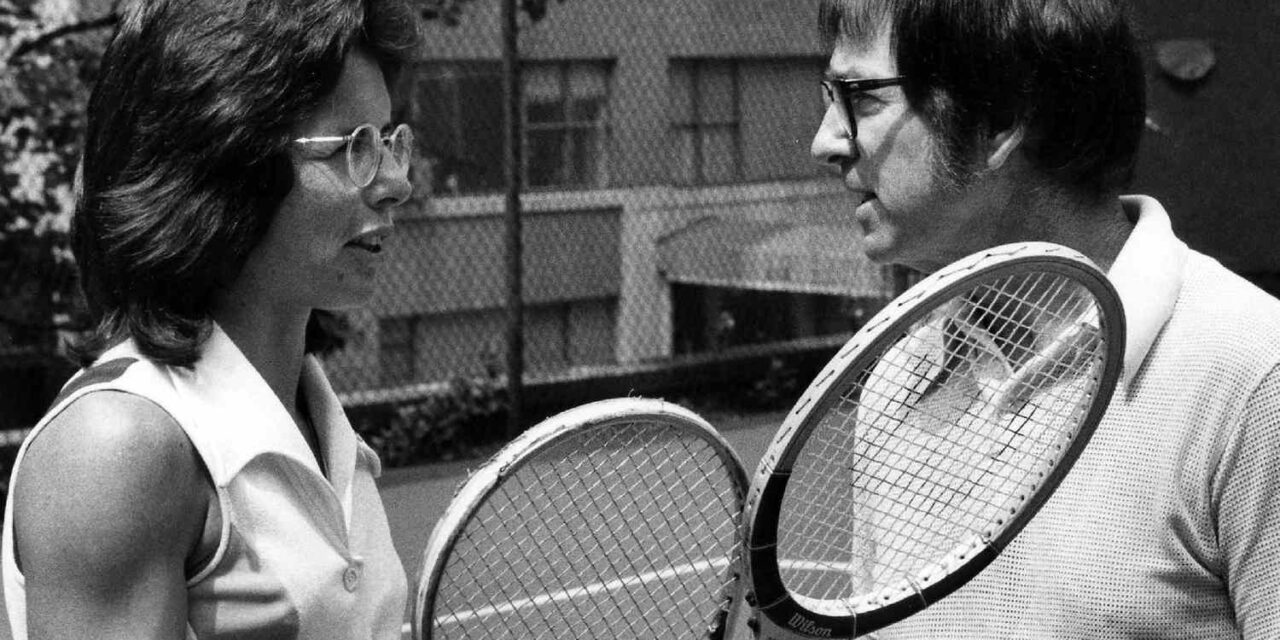
The battle for gender equality in sports in far from over, but female athletes have never failed to prove that its a worthy fight. Between Olympics Games and professional play, trailblazing women have continued to astonish the minute they get their feet on the field, their hands on the ball and their heads in the game.
Girls going pro today stand tall on the shoulders of giants, from Billie Jean King to Mia Hamm to Serena Williams. See the astounding feats that made these women and more some of the greatest athletes of all time.
Billie Jean King Wins the ‘Battle of the Sexes’ in 1973
Jerry Cooke /Sports Illustrated via Getty
In 1973, a worldwide audience of about 90 million people watched Billie Jean King defeat Bobby Riggs, a retired tennis pro who once held the No. 1 ranking in the men’s circuit. Riggs had been making disparaging comments about women’s tennis, boasting that no female player could beat him, even in his retirement, and extended the challenge to King.
When King finally accepted Riggs’ chauvinistic challenge and took him on in what became known as the Battle of the Sexes, she won in three straight sets: 6–4, 6–3, 6–3. The historic triumph lived on as a symbol of women’s achievement in sports and progress in society.
It also led to a few more historic firsts for women in her name: In 1973, he US Open became the first sporting event to offer equal prize money for the women’s and men’s tournaments, and in 2006 the National Tennis Center (where the US Open is played) was renamed the USTA Billie Jean King National Tennis Center, making King the first woman to have a sports stadium named for her.
Kathrine Switzer Runs the Boston Marathon in 1967
Paul J. Connell/The Boston Globe via Getty
Kathrine Switzer became the first woman to complete the Boston Marathon (then limited to men) as a registered runner in 1967, wearing full sweats in an effort to go unnoticed. At once point during the 26.2 miles, a race official spotted her and tried to pull off her bib. Switzer’s then-boyfriend pushed the angry administrator away – a moment that was photographed into history forever.
As a result of her run – which Switzer, then 20 years old, completed in four hours and 20 seconds – the Amateur Athletic Union banned women from competing in races against men until 1972.
In a 2018 interview with PEOPLE, Switzer looked back on the day she carved her name into women’s sports history.
“Sometimes the worst things in your life become the best things. When the angry official attacked me in that first race, it was a frightening, humiliating moment,” she said. “But it was also radicalizing. It made me realize that people didn’t believe in women’s capabilities, so I was determined to finish the race no matter what, even on my hands and knees if I had to, to prove women could do it.”
Lisa Leslie Dunks in a WNBA Game in 2002
Lisa Blumenfeld/NBAE/Getty (2)
Professional basketball opened courts to women in 1996, with the first WNBA season beginning in June of the following year. The league consisted of eight teams, including the Los Angeles Sparks and its star player, Lisa Leslie.
The very establishment of the Women’s National Basketball Association was a major win for equality in sports, but Leslie further evened the playing field when she dunked the first basketball in WNBA history in 2002. With that feat of athleticism, Leslie proved that girls can play just as hard as the guys.
Mia Hamm Inducted Into the World Football Hall of Fame in 2013
Stanley Hu/WireImage
As a two-time FIFA Women’s World Cup winner and two-time Olympic gold medalist, Mia Hamm no doubt earned her spot in the World Football Hall of Fame in 2013. The soccer star was the first woman to receive the honor, and she’s since been joined by several more remarkable female athletes from around the world.
Wilma Rudolph Wins Three Medals at the 1960 Olympics
Bettmann Archive/Getty
As a Black woman born prematurely in pre-Civil Rights Tennessee, who overcame infantile paralysis caused by the poliovirus that caused her to wear a leg brace until she was 12, the odds were fiercely against Wilma Rudolph becoming a worldwide track superstar. Despite every obstacle, she became a record-breaking Olympian and remains a legend in the running world. In 1960, Rudolph became the first American woman to win three gold track and field medals in a single Olympics Games.
Before her death at age 54 in 1994 due to brain cancer, Rudolph earned her spot in several of sports’ greatest honor rolls. Her name can be spotted in the U.S. Olympic Hall of Fame, the Black Sports Hall of Fame, the National Women’s Hall of Fame and the U.S. National Track and Field Hall of Fame, among others.
Serena Williams’ ‘Serena Slam’ Win at the 2003 Australian Open
Sean Garnsworthy/Getty
In January 2003, Serena Williams defeated her older sister, Venus (pictured left), at the Australian Open. Serena was an undeniable supernova already, but her triumph Down Under marked an especially significant feat. She became the fifth woman to hold all four major singles Grand Slam titles at one time, a feat that the press dubbed the “Serena Slam.”
Williams got emotional about her triumph after the match. “I’m really, really, really happy. I’d like to thank my mom and my dad for helping me,” she told The New York Times, reportedly on the verge of tears.
Babe Didrikson Wins Big at the 1932 Olympics
Bettmann Archive/Getty
Babe Didrikson made her name across the athletic world, competing and excelling in golf, basketball, baseball and track and field. Her multi-event win at the 1932 Olympics didn’t just raise the bar for female sports – she achieved what no man or woman had done before or has done again.
A track and field trailblazer, Didrikson proved she could do it all. She won gold in the 80-meter hurdle run and in the javelin throw, and she took home the silver medal in the high jump. She remains the only Olympian to win medals across throwing, jumping and running events.
Althea Gibson Wins the 1956 French Open
Bettmann Archive/Getty
Althea Gibson is a trailblazer often referenced by other athletes as an inspiration. The tennis pro became the first Black person to win the French, Wimbledon and U.S. Open singles championships, all between 1956 and 1958. (Once she reached the height of her tennis career, she turned to professional golf and became the first Black member of the Ladies’ Professional Golf Association in 1964.)
Flo-Jo Wins Three Medals at the 1988 Olympics
David Madison/Getty
Florence Griffith Joyner – or Flo-Jo, as she’s best known – was recognized as the fastest woman in the world after she won three gold medals in track and field. At the 1988 Olympics in Seoul, she set world records for both the 100- and 200-meter dashes. Flo-Jo’s 10.62-second sprint in the 100-meter event remained an Olympic record for 33 years; Jamaican runner Elaine Thompson-Herah beat it by a one-hundredth of a second in 2021.
Beyond the Olympics, though, Flo-Jo still holds the world record for fastest 100-meter run. The late athlete–who died at age 38 after suffering a seizure in her sleep–ran it in 10.42 seconds during the Olympic trials before Seoul.
The First Women’s World Cup in 1991
TOMMY CHENG/AFP via Getty
The United States beat 11 other teams from around the world in the first FIFA Women’s World Cup in 1991, with Norway coming in as the runner up. The inaugural tournament – which was held in Guangdong, China – was officially called the 1st FIFA World Championship for Women’s Football for the M&M’s Cup. The unusual title was a result of FIFA’s early hesitancy to associate its brand with women’s sports.
The U.S. women’s national soccer team now stands as the most successful squad in the international pool. After 1991, they won four more FIFA World Cups, and they’ve taken home a total of four Olympic gold medals, starting with their first win in 1996.





